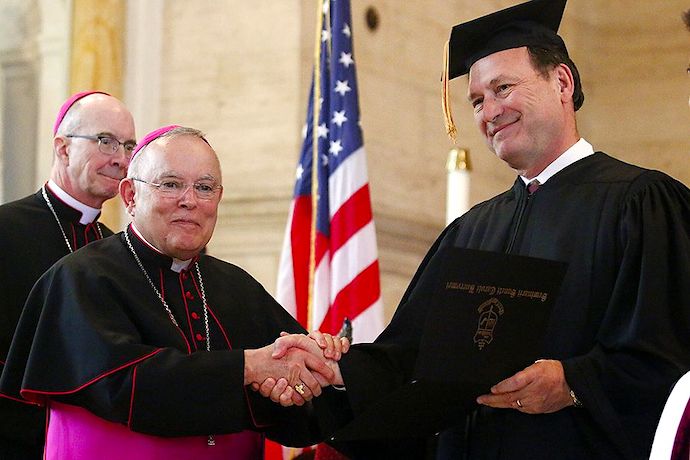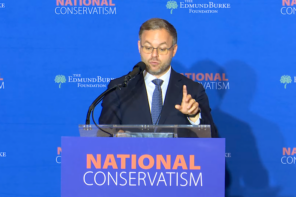The separation of religion and government is a basic human right. The protests in Iran and the theocratic regime’s lethal attempts to suffocate the spark of human freedom are a case study proving this truism. But that regime’s obsessive imposition of one narrow religious belief on an entire population also tells us something about the end of Roe v. Wade.
Iran hanged—murdered—Majidreza Rahnavard, 23, three weeks after his arrest for the crime of “enmity against God,” and four days after the state had executed Mohsen Shekari for the same crime. Both men appeared to have been beaten in custody, confessed under torture or duress, and, though ostensibly given lawyers, were denied any meaningful legal defense. The show trials and public executions are meant to intimidate protesters.
So far, the regime’s forces have killed nearly 500 protesters and arrested more than 18,000.
The protests against Iran’s clerical regime were sparked by the “morality police” or Guidance Patrol’s obsessive enforcement of oppressive dress codes for women, which arrested Mahsa Amini for not wearing a hijab. Eyewitnesses say the police beat her to death.
The existence of a theocracy, let alone a police force to impose that regime, violates our basic human rights. The alleged crime is “Enmity against God.” For speaking out. For refusing to wear a piece of clothing. For exercising freedom of thought and expression. For thoughtcrime. And that is precisely why separating religion and government is a basic human right: freedom of thought.
The morality police arrested Amini for “justification and education” about the hijab, which sounds like something out of 1984. And, like the Ministry of Love and Ministry of Truth in 1984, the morality police are not concerned with morality. The morality police have little to do with morality—they’re the religious police, violently enforcing religious edicts.
But despite many of its critics’ assumptions, Iran—and for that matter, Islam—have no unique claim to repression. As Iran protests this theocratic tyranny, the U.S. slides toward it. Rather, the Supreme Court is pushing us toward that end. For too long Americans have taken the separation of church and state for granted, and our collective failure to defend it has let the ultra-conservative majority on the court dismantle this basic protection. Sometimes in obvious ways, tearing down the wall of separation between church and state in case after case.
Sometimes in more insidious ways, as when Justice Sam Alito imposed a narrow religious edict on the country in his Dobbs opinion overturning Roe v. Wade, which he camouflaged in the language of morality. The legislator who sponsored the Mississippi law that was at issue in the Dobbs case justified the measure in part by declaring that “children are a gift from God.” When the law was challenged in court, she asked her followers to “pray that these judges know that at three months of life these babies feel pain and deserve the life that God has given them.” Alito and the other justices knew this—it was well explained in a friend-of-the-court brief by Americans United for Separation of Church and State. Plus, during the oral argument, Justice Sonia Sotomayor asked the lawyer for the state of Mississippi:
“How is your interest anything but a religious view? … when you say [abortion] is the only right that takes away from the state the ability to protect a life, that’s a religious view, isn’t it?”
The attorney struggled to answer Sotomayor’s question because she’s exactly right.
Outside of describing previous cases, “religion” only gets one mention in the Dobbs decision, and that’s in the dissent. Alito scrubbed the rhetoric in his opinion and, like Iran’s police force, he substituted “morality” for “religion.” This isn’t to say there’s no moral dimension to these questions, but that Alito’s morality is premised on a religious doctrine defining life.
If you need more evidence, just listen to Sam Alito speaking to a group of fellow Catholic lawyers, Advocati Christi, in 2017. Focusing on religion and religious freedom he issued a call to arms: “It is up to all of us to evangelize our fellow Americans about the issue of religious freedom.” “A wind is picking up that is hostile to those with traditional moral beliefs,” he said, conflating conservative religion with morality.
By “traditional moral beliefs” Alito means “religion”—just as he does in his Dobbs opinion.
The abortion ban that Alito and the other conservative justices upheld imposes one narrow religious edict on us all.
Here in the US, we often talk about the separation of religion and government as a constitutional command. Or a metaphorical wall, as I have in this article. When exploring the foundations of the principle we detail all the ways it reinforces and guarantees freedom and democracy; that this separation is a prerequisite for freedom and democracy because shielding our shared laws from any religion’s influence frees us to come together as equals and build a stronger democracy. The separation of religion and government is all of these and more. But it’s also simpler.
The separation of religion and government is a basic human right. Let’s hope the Iranian protesters make progress toward securing that right and that Americans recommit to this founding principle. Before it’s too late.





